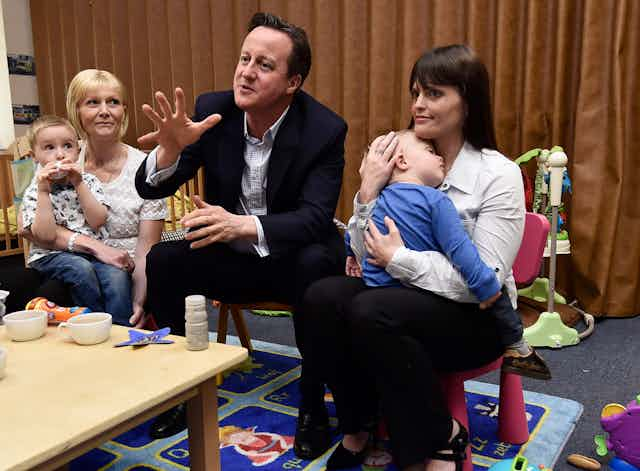As part of a government push to invest more in supporting families, David Cameron has outlined that a key part of a new Life Chances Strategy will focus on the role of families in ensuring the best start for children.
The prime minister has returned to the idea of parenting education, arguing that: “we now need to think how to make it normal – even aspirational to attend parenting classes”.
Cameron’s reassertion of state support for parenting class provision predictably drew some sceptical responses. The Spectator’s Fraser Nelson questioned whether parenting classes could “be effectively delivered by the state”, and accused such provision as representing “Big Brother’s parenting classes”. In a more measured piece in The Observer, Daniel Boffey, referenced the government’s previous foray into parenting – the CANparent pilot – which, Boffey argued “ended in meltdown and embarrassment”.
Criticism of state-supported parenting classes comes from both the left and the right of the political spectrum. The right tend to deploy arguments concerning the growth of the “nanny state”, while the left are exercised by issues of class and social control.
None of this is new, and has accompanied state involvement in child-rearing since the 19th century Factory Acts began the process of ending child labour. Similar objections were also raised with the introduction of compulsory elementary education by the Elementary Education Act 1880.
New Labour focus on parents
In our own time, it was the “New” Labour governments of 1997-2010 which boosted state support for parenting education. A wide range of family-focused initiatives were designed to support families and improve individual, family, and social outcomes. “New” Labour established a model of parent and family support that stressed “rights and responsibilities”.
Various policy initiatives were matched by important government reports and legislation, including the Every Child Matters in 2003, the 2004 Children Act, and the 2007 Children’s Plan.
In 2006, the government published the Respect Action Plan, promising action to improve parenting provision nationally, focusing help on parents who needed it most. This was the foundation for the Parenting Early Intervention Programme (PEIP).
The PEIP ran from 2006-2011 and offered parenting programmes via local authorities for parents of children aged eight to 13, focusing on families and children at risk of anti-social behaviour. The PEIP was independently evaluated by colleagues and me at the Centre for Educational Development, Appraisal and Research at the University of Warwick.

Our evaluation showed that, although the PEIP was a targeted intervention, take-up was wider and encompassed many middle-class families. It showed that parenting education was in demand from, and benefited, a wide cross-section of the population.
Lessons of CANparent
After 2010 when the Conservative-Liberal Democrat coalition government took office, it followed Labour’s broad approach to family policy. A combination of the post-crash period of austerity, and an ideological preference for market choice, led to a trial of a new programme called CANparent.
The trial was a small-scale, but high-profile initiative launched by Cameron in May 2012 that ran until March 2014. It was aimed at parents and carers of children aged 0-5 years living in three English districts: Camden, High Peak in Derbyshire and Middlesbrough. It offered all parents – not just those at risk of anti-social behaviour – the opportunity to access a choice of parenting courses in their area.
The aim was to stimulate the market for parenting classes, open to all parents and carers with the rationale that all parents could benefit from support to develop their parenting skills.
My colleagues and I also evaluated the CANparent Trial for the government. Although critics argued that the trial was a failure – and the government did not continue it after the trial ended – our evaluation showed elements of success.
There was evidence of the need for parent support, in addition to those traditionally provided to more “problem families”. Parenting programmes based on evidence were also generally effective in a range of areas, such as improving parents’ satisfaction with being a parent, their mental well-being and life satisfaction. Parents who attended the CANparent classes were also overwhelmingly positive about their experience and reported that their classes led to changes in their own behaviour, with a positive impact on their children.
But the evaluation also highlighted challenges in how to provide this type of early intervention using a quasi-market model. Those challenges, such as using a voucher-driven model through which parents could purchase classes of their choice run by different providers, will need to be addressed in the government’s forthcoming plans.
Cameron’s re-commitment to parenting education represents a continuing theme in recent family policy. There will be challenges in any implementation of state-backed parenting support, but it is clearly a policy that looks to be here to stay.

